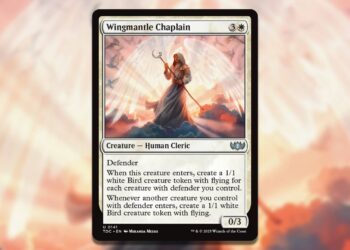Making Your Bastion a Gold Mine in Dungeons & Dragons
In Dungeons & Dragons, bastions offer players a chance to spend their earned gold on a lovely home filled with valuable facilities. These facilities aren’t just for show—they can also generate additional income, because you can never have too much gold.
If you’re curious about transforming your bastion into a thriving merchant hub, or if you simply want to amass a treasure trove for your dragonborn character, this guide is for you. We’ll explore effective facilities for generating revenue, the financial investments required, and how your teammates can contribute to your wealth.
Bastion Level Five
You unlock bastions at level five, enabling you to select two basic facilities and two special ones. Basic facilities typically don’t offer any benefits, and while you can spend gold to acquire more, our focus here is on generating profit rather than spending it.
You’ll also need to think about how to protect your investment. It’s wise for another player to concentrate on defense and combine their bastion with yours. This way, they can provide security while you rake in the profit.
Special Facilities
The storehouse is a key facility you should invest in, as it upgrades each time you expand your bastion. By issuing a trade order to the storehouse, you can allocate up to 500 gold, and your hireling will spend the next seven days purchasing goods. Once acquired, you can make another trade order to sell these goods for a 10% profit after another seven days.
While you must initiate the trade orders, the initial investment of gold sets the stage for future gains. If you maximize your trading throughout the in-game month, you could earn around 1,000 gold per month—and this is in-game time, not real-world.
Your second facility hinges on your goals. Facilities that produce items can enhance your income as long as you can sell the crafted items, which depends on your campaign’s setting.
| Special Facility | Item to Craft | Gold Investment | Time to Craft | Profit | Monthly Profit |
|---|---|---|---|---|---|
| Garden | Potion of Healing | 0 | 7 days | 50 | 200 |
| Smithy | Splint Armor | 100 | 10 days* | 100 | 300 |
| Workshop | Pistol | 125 | 7 days** | 125 | 375 |
*Requires both hirelings to work together.
**Production depends on DM’s discretion.
This guide assumes a focus on profit. If your priority is defense, opting for barracks as your second facility could be a wise choice to safeguard your gold.
Recommended Spells
Bastions can only be attacked in a couple of ways: through narrative decisions made by your Dungeon Master or by rolling on the bastion event table, which kicks in if you fail to issue orders. Keeping your orders active minimizes the risk of attacks.
If your campaign is centered around your bastion, don’t worry; there are spells to keep in touch when you’re away. Sending is especially useful for maintaining communication over distances.
(Note: The Sending spell is accessible to bards, clerics, wizards, and aberrant sorcerers.)
If you’re just a few towns away, spells like Animal Messenger can be handy as well, or you could simply hire a messenger to relay information. If bastions are close together, communication costs can be further reduced.
Bastion Level Nine
Reaching level nine offers a significant boost for your gold-making bastion as you gain an additional facility dedicated solely to profit. Many crafting facilities can now create common and uncommon magic items, increasing your potential inventory of rare goods to sell.
Your storehouse allows you to invest up to 2,000 gold and earn back 20%, bringing your maximum monthly profits to 800 gold. That’s enough to justify building defensive walls around your bastion.
One innovative option at this level is transforming your gaming hall into a gambling hall for a week at no cost, yielding potential profits of 10 to 600 gold per week. While it’s not entirely reliable, it’s still a bonus since there’s no cost involved.
Continuing with more crafting facilities allows you to generate and sell what they produce. Selling crafted items will depend on your approach and potential market conditions in the campaign.
| Special Facility | Item to Craft | Gold Investment | Time to Craft | Profit | Monthly Profit |
|---|---|---|---|---|---|
| Greenhouse | Potion of Greater Healing | 0 | 7 days | 400 | 1,600 |
| Smithy | Uncommon Magic Item | 200 | 7 days | 200 | 800 |
| Laboratory | Torpor | 0 | 7 days | 600 | 2,400 |
If you already have a smithy or workshop, upgrading to crafting uncommon magic items is a rewarding move. Replacing a garden with a greenhouse enhances your production potential.
For those already accruing ample gold, consider adding a teleportation circle facility, which allows quick travel back to cash in on your earnings. This circle isn’t required to be within your bastion but should be nearby.
(Note: The Teleportation Circle spell is accessible to bards, sorcerers, warlocks, and wizards.)
Bastion Level 13
At level 13, earnings become less dramatic in quantity, even as you’re allowed an extra special facility. If you’re looking to increase your earnings, consider earlier facilities instead.
At this level, your storehouse upgrades to allow investing up to 5,000 gold and provides 50% in profit, meaning monthly earnings can reach 5,000 gold—a boon for any adventurer!
New facilities introduced at this level include a meditation chamber (which allows you to roll twice on bastion events and select a result) and a pub (helping you keep an eye on developments around your bastion).
As your adventures take you further from your bastion, spells to return swiftly become essential. For example, Druids can use Transport via Plants, while Clerics benefit from Word of Recall for expedient travel.
Bastion Level 17
By the time you reach level 17, it’s more about spending your accumulated wealth than just making more. Even at this later stage, your storehouse continues to upgrade, showcasing its enduring value.
At level 17, your storehouse allows you to recover 100% of your investment (up to 5,000 gold). If you want to explore black market trading, constructing a thieves’ guild using the guildhall special facility is an option—but you’ll need proficiency in a relevant skill.
To best utilize your funds, consider building a war room, requiring you to have a combat style or unarmored defense feature. This will enable you to invest your riches into forming an army for conquest across the realms.





